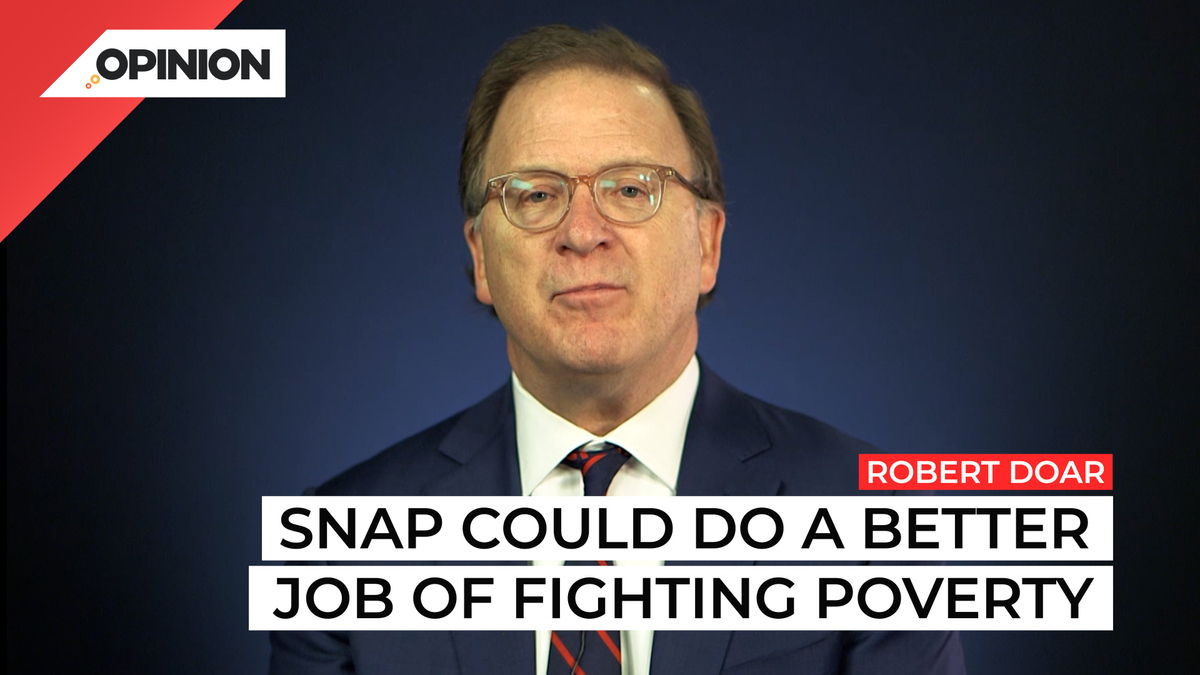
Commentary
-
Our commentary partners will help you reach your own conclusions on complex topics.
The Supplemental Nutrition Assistance Program, or SNAP, is one of America’s largest safety and assistance programs. Better known as food stamps, SNAP gives low-income Americans federal aid to purchase groceries. Last year, more than 41 million Americans receive more than $114 billion in total benefits through SNAP. On average, each recipient received about $230 a month.
SNAP is a core part of our federal safety net and it protects millions of families and individuals from hunger in times of financial need. But unfortunately, like much of our safety net, it could do a better job fighting poverty. This year, lawmakers have the chance to make SNAP work much better. The 2023 farm bill now under negotiation in Congress can include big changes to SNAP because it’s administered by the United States Department of Agriculture. If lawmakers want to improve snap, now’s the time for them to do it.
SNAP appropriately provides aid to millions of working Americans, and it aids senior citizens and people with disabilities. But it also provides aid to millions of working-age adults who do not work at all. And for these Americans, SNAP needs a work requirement, more than anything else to help lift these individuals out of poverty. Overwhelming evidence shows that a combination of work in government support provides the best path out of poverty. Earnings from work supplemented by government aid, helps recipients financially. But you can’t combine earnings with aid if you are not employed. And SNAP does very little to help recipients find a job.
The program’s weak support for work can be seen in the low share of its recipients with jobs. According to an upcoming report from AEI scholars, less than 48% of all parents receiving SNAP worked in 2019. And only about 27% of SNAP recipients without children and who aren’t disabled had jobs. These non-working recipients on SNAP are almost surely in poverty and they are not benefiting from the income and social benefits that come from being employed. To help these individuals, non-disabled adult recipients should only receive SNAP with the requirement that they work, look for work, or enter some kind of training or education program. They need to be engaged in these activities for at least one day of every week. We don’t need to enforce long hours or specific choices. But we have to push a little to help people move up economically.
This will require greater engagement from local social services departments. These agencies could help recipients find jobs or enter training programs. Right now, social workers only sign up SNAP recipients and hand out benefits. In effect, they say to a struggling adult, “Here’s your debit card. See you in a year.” If they had stronger engagement requirements and more federal guidance, social services providers could do a lot more.
Now while work requirements are what’s most needed, SNAP needs other improvements as well. Nutrition should also be a priority. The United States Department of Agriculture would send a strong message about better nutrition if recipients were prohibited from using SNAP to purchase sugar-sweetened beverages, which are a leading cause of childhood obesity. Sweetened beverages are some of the most popular items bought with SNAP. According to a 2016 USDA report, sweetened beverages made up nearly 10% of all food purchases by SNAP-receiving households; more than $600 million in just one year on sweetened beverages.
Now progressives say we shouldn’t restrict the choices of struggling Americans and often claim that recipients buy unhealthy food because it is cheaper than healthier alternatives. But that’s simply not true. A 2018 USDA report found that SNAP recipients scored lower on the USDA’s own measures of healthy eating than households with lower incomes, but who don’t receive SNAP. The report stated compared to lower income non-participants, SNAP-participating households acquired 31% fewer total vegetables, 40% fewer dark green vegetables and beans, 24% fewer whole fruits, 20% fewer whole grains, and 27% fewer seafood and plant proteins.
SNAP recipients don’t buy unhealthy items because they’re cheaper than the alternative. These products are also marketed directly to SNAP recipients and are effectively subsidized by the federal government. All through a program that calls itself nutrition assistance.
To summarize, SNAP is a good program and should not be abandoned, but we have to ensure it is helping recipients move up. In general, safety net programs such as SNAP are supposed to provide temporary supports in times of dire need, or supplement earnings for low-income families. Government aid programs should only provide income for non-working, able-bodied adults, when those benefits come with efforts to help them find employment.
This year, policymakers can turn SNAP into a program that better helps Americans escape poverty and make healthier choices. Let’s hope they seize the opportunity.
-
Affirmative action ruling consistent with struggle against US racist past
When the Supreme Court struck down affirmative action programs at the University of North Carolina and Harvard, conservatives celebrated the decision, hailing it as a victory for a “colorblind” interpretation of the Constitution. Former President Donald Trump praised the ruling as a “great day for America.” Democrats, on the other hand, criticized the decision, arguing… -
Census data paints an inaccurate picture of inequality in America
The U.S. Census Bureau is a nonpartisan government agency, responsible for not only determining how many representatives each state will have in Congress for the next 10 years, but also for collecting income data. By asking about income, the Bureau’s intent is to “help communities enroll eligible families in programs designed to assist them.” But… -
Elites have lost the trust and confidence of Americans
The Cambridge Dictionary defines the liberal elite as “a group of people with education, money, and other advantages, often living in cities, who have liberal political views and are seen as not understanding the problems and views of ordinary people.” Former President Donald Trump’s war on elites was central to his 2016 campaign and could be weaponized again should he run in 2024. Straight Arrow News… -
American men need to start taking more personal responsibility
Some members of the Republican party, such as former President Donald Trump and Sen. Josh Hawley (R-MO), blame Democrats for starting a war against American men. These voices want government action taken to protect men from policies meant to undermine their roles in society. But is government intervention really the answer? Straight Arrow News contributor Robert…
Latest Opinions
-
 AP Images
AP Images
MN Supreme Court rules against GOP as Dems boycott House
-
 Getty Images
Getty Images
Target to roll back DEI policies following Trump’s executive order
-
 Getty Images
Getty Images
AFC Championship a rematch for the ages between Bills and Chiefs
-
 Getty Images
Getty Images
Alleged Sinaloa cartel leader extradited for federal drug charges in San Diego
-
 Getty Images
Getty Images
Concert season gearing up as more artists announce tours for 2025
Popular Opinions
-
In addition to the facts, we believe it’s vital to hear perspectives from all sides of the political spectrum.






